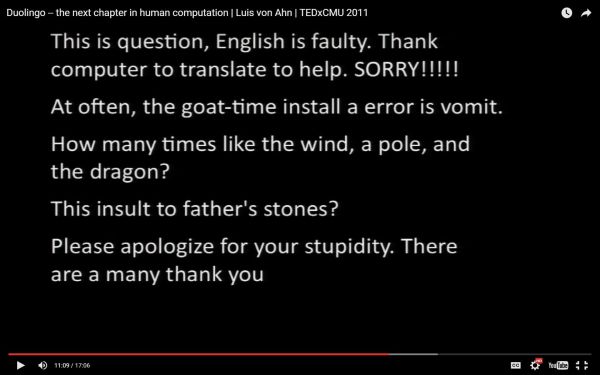
“It is Christmas, but Santa won’t bring me a girlfriend!” (Source: Anime Comical Psychosomatic Medicine. Not recommended for work or church.) When the magic of religion fails to deliver material results, back into the frog pond we go to survive and reproduce.
It is kind of understandable that people turn to materialism. After all, spirituality borders directly on insanity. I still remember a young friend of me painfully insisting: “It has to be spiritual!” He was on leave from the psychiatric hospital, having had a severe breakdown some time earlier. He was one of the smartest guys I have met, and a very sincere Christian with high standards of morality, especially for himself. But he could not stomach hearing his friends and family talk and laugh about earthly things. “It has to be spiritual!”
No, it doesn’t have to be spiritual, because we humans are spiritual amphibians, like frogs. The frogs are hatched in water and grow up there, eventually being able to peek out of it, and they grow small limbs that grow bigger, while their fish-like tail shrinks over time. But even though they climb out of the water in their early youth, they never become truly independent of it as long as they live. They have to return to the water regularly, and this is also where they lay their eggs, starting the process all over again.
We humans are also born into a lower world, the material world. And we don’t outgrow it as long as we live. We need our daily bread, but we do not live by bread alone. If we do, we become beasts, much as some salamanders who spend their entire life in water like a fish. The frog spends much of its time in air, and normal humans also live in two realms: The material and the spiritual. You can live fine in matter alone, but then you are a human only genetically, if that. Most people who think they are materialists are actually far from it,
In its most extreme form, materialism is either stupid or insane. The stupid is when people say “the mind is a product of the brain”. This is about as intelligent as “My computer does not need software: I just turn it on and it works!” Before the computer age, we could compare it to a chemist who analyzes a book, finding only paper and ink, no magic component called “meaning”. If he were to weigh the paper and the ink before and after printing, he would be able to conclude scientifically that nothing was added by the printing process. In other words, reading is pure superstition, physically impossible. And yet it happens, because humans are not like your average animal. We live in an extra layer of meaning, which extends quite a bit beyond the “smell of food means food” layer of meaning we share with our furry friends.
In dogs, the sense of meaning can be extended a little bit, as in the famous Pavlov’s dogs. He would ring a bell before feeding them, and eventually they would salivate from the sound of the bell alone. But humans don’t just breach the surface of meaning, we tend to spend pretty much our entire day in that realm, returning only for survival and reproduction. My friend who insisted that everything “must be spiritual” had early developed a healthy fear of sexuality, as well he should: Few things can as rapidly pull people back in the material realm. In civilized cultures, the concept of “romance” – of spiritualizing sexuality – is one of the most difficult, and some never really get it. And this is also where a whole lot of people decide that the dry land is not for them, and jump back in the pond of materialism.
I believe it is a terrible mistake to push people into the spiritual. A lot of trouble comes from being too fast with this. Just because the tadpole has grown small limbs does not mean they should be pushed out of the water. They will follow the adults up in the air naturally, given time. But if we try to pull them up, they are not ready to live there, much less to wander far from the pond. When people move too fast and too far away from the material pond, insanity sets in, either personal or collective. Weird memes take root, and the sun and the moon are pulled across the sky by invisible pink unicorns.
Religion contains a lot of weird stuff, which is as meaningless on its own as the magical invisible component of writing is to our book-analyzing chemist. When we insist that the spiritual exist in the material world, we come up with magic. It is true that any sufficiently advanced spirituality is indistinguishable from magic, but we should take great care to not pretend that God literally “exists”. (Technically, existence is different from being.) For to say that God exists in the world would be to say “the house is in this room”, and this is both true and false simultaneously. This is why religion needs the incarnation, to represent the house inside the room of the material world. Although a philosophical religion such as Buddhism does not have incarnations, the large mass of simple Buddhists still see the Buddha as such. Some religions venerate holy books or other holy objects, or holy places. Material things imbued with the sacred. But to the salamander who never leaves the water, these things are pure superstition. And that is exactly correct, for them. If they were forced to venerate such things, it would be pure magic, like an illiterate person forced to recite the text of a book while staring at it, without having any idea of what reading and writing really is.
Spirituality is experiential. It is something you experience, or you don’t. If you have been exposed to an elaborate description of the spiritual realm while you were still a tadpole, it can actually keep you from seeing the real thing. While you are a tadpole, everything you learn about the dry land is only in your head, a mental model. And it is possible to grow up and expand and refine that mental model, becoming a theologian without ever noticing the reality of that realm, always thinking of one’s own mental model as the real thing. Even as an adult frog, living most of your workday in abstractions, you will still regard the magic system in your head as the spiritual world, and the material world as the real world.
But only an idiot or a low-functioning autist can actually be a practicing materialist. The moment we start believing in such things as truth or beauty or goodness, we start poking our head out of the water and enter a realm where our furry friends can never follow us. Certainly a dog can be more loyal than your best two-legged friend, but the dog has no concept of loyalty as such, even if he incarnates it. A bird that pretends to be wounded to lure a predator away from her nest is likewise a heart-rending example of love, and yet she has no concept of love as such. Only we can see such things.
“Proof of God is abundant for those who do not need it.” But for those who are smart and learn too much about the dry land when they are still tadpoles, there is a risk that they will first swim in the water insisting that they are on land, and later walk on land insisting that they are still in the water. And that is a damned shame, because both of these are beautiful worlds, and a mature human should live in them both.

